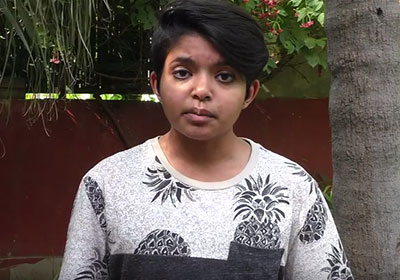Indian high court says being LGBT is a fundamental right

Shivani Bhat (YouTube / Nazariya Qfrg)
In a ruling relating to a transgender youth held captive by his family, the Delhi High Court has affirmed the right of individuals to be LGBT.
The ruling earlier this month concerned the case of Shivani Bhat, a 19-year-old trans man studying in the US, who claimed that his parents had forced him to stay in India and to act like a “proper girl.”
Bhat said he had been confined in his grandparents’ home in Agra against his will and that the family confiscated his passport and green card.
He sought support from the Nazariya queer feminist group, which helped him escape to a safe space in Delhi.
The court described Bhat as “brave hearted” and praised him for his “indomitable spirit.”
In the ruling, Justice Siddharth Mridul said that, “Gender identity and sexual orientation are fundamental to the right of self-determination, dignity and freedom. These freedoms lie at the heart of personal autonomy and freedom of individuals.”
He went on to insist that, “The time has come for us to mainstream the transgender community. Prejudice is so rampant, so authoritatively practised that even families fall prey to its all pervasive pressure.”
Bhat’s family has since agreed to allow him to return to the US and to finance his education and living expenses for the next three years.
“It is made clear that Shivani shall travel unaccompanied and will not be subjected to any harassment by the extended family upon arrival in the United States of America,” said the court.
Rituparna Borah from Nazariya commented: “I am elated with the judgement as it upholds individual freedom and liberty of gender identity and sexual expression. [I] hope this judgement helps other people who are still struggling and facing custodial violence from family.”
While transgender people are being increasingly legally empowered following a 2014 ruling by India’s Supreme Court ordering the government to officially recognise transgender people as full citizens, gay and lesbian sex remain illegal.
In December 2013, the Indian Supreme Court restored a 153-year-old colonial-era ban on gay sex; seen by human rights groups as a major step backwards for the country.
The court said then that gays and lesbians were too small a community to warrant constitutional protection and that it should be up to lawmakers to change the anti-gay law and not the courts.
The court has since agreed to consider a request that it re-look at the judgement.
Leave a Reply